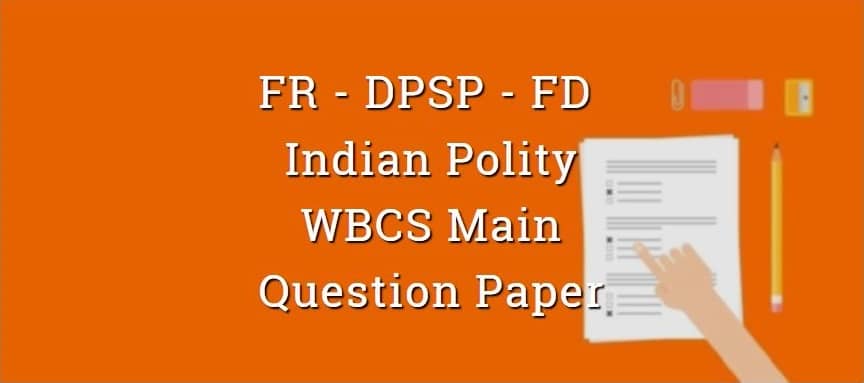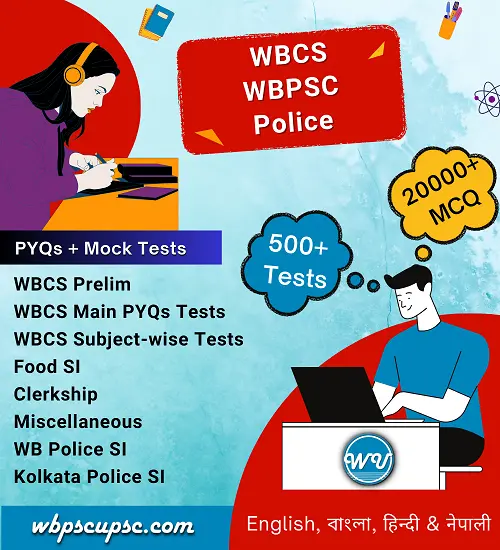FR, DPSP & FD – Indian Polity – WBCS Main Question Paper
Contents

fundamental rights questions
WBCS Main Question Paper – 2022
2. The directive of separation of judiciary from executive is mentioned under
(A) Article 48
(B) Article 49
(C) Article 50
(D) Article 51
3. Right against double jeopardy is enshrined under
(A) Article 20(1)
(B) Article 20(2)
(C) Article 20(3)
(D) Article 20(4)
5. The appropriate writ issued by the court to quash the appointment of a person to a public office is that of
(A) Mandamus
(B) Certiorari
(C) Quo Warranto
(D) Prohibition
6. Reservations in promotion in favour of SCs and STs are dealt under
(A) Article 16(3)
(B) Article 16(4)
(C) Article 16(4A)
(D) Article 16(4B)
12. How many fundamental duties are there under Article 51-A of the Constitution of India?
(A) 9
(B) 10
(C) 11
(D) 12
17. The Fundamental Rights of the Indian citizens have enumerated in the Constitution of India in
(A) Articles 12-35
(B) Articles 13-36
(C) Articles 14-36
(D) Articles 14-51
19. Freedom of Conscience is subject to
(A) Public Order
(B) Morality
(C) Health
(D) All of the Above
22. In India Right to Property is a
(A) Moral Right
(B) Legal Right
(C) Fundamental Right
(D) Personal Right
26. Under Article 15 of the Constitution of India, States shall not discriminate against any citizen only on the ground of
(A) Religion, race, caste, sex, residence
(B) Religion, caste, sex, place of birth, residence
(C) Religion, race, caste, sex, place of birth
(D) Religion, race, caste, sex, place of birth, descent, residence
28. Who can enact a law on abolition of Untouchability ?
(A) The Parliament of India vide Article 17
(B) The Parliament of India vide Article 35(a)(ii)
(C) State Legislatures vide Article 17 and 21
(D) All of the Above
34. “Equal justice and free legal aid” is incorporated in the Constitution of India in
(A) Article 21A
(B) Article 39A
(C) Article 43A
(D) Article 48A
37. Article 32 stands suspended during an emergency under Article
(A) 352
(B) 356
(C) 260
(D) 362
62. Which of the following Articles of the Constitution of India guarantees the right to move freely throughout the territory of India?
(A) Article 19(1)b
(B) Article 19(1)c
(C) Article 19(1)d
(D) Article 19(1)e
64. Which of the following Fundamental Rights do not get abolished automatically during National Emergency?
(A) Articles 14 and 19
(B) Articles 19 and 20
(C) Articles 20 and 21
(D) Articles 32 and 226
70. Clause 4 of the Article 15 of the Constitution of India has been added to the Constitution by
(A) The Constitution Forth Amendment Act
(B) The Constitution Third Amendment Act
(C) The Constitution Second Amendment Act
(D) The Constitution First Amendment Act
71. Fundamental Duty to uphold and protect the sovereignty, unity and integrity of India is enshrined in
(A) Article 51A (a)
(B) Article 51A (b)
(C) Article 51A (c)
(D) Article 51A (d)
73. Duty of the state to raise the level of nutrition and the standard of living and to promote public health is Directive principle under
(A) Article 47
(B) Article 48
(C) Article 49
(D) Article 50
77. Directive Principles of State Policy is
(A) Justifiable
(B) Non-Justifiable
(C) Mandatory
(D) None of the above
88. Reasonable restriction to right to assemble peacefully is placed under
(A) Article 19(2)
(B) Article 19(3)
(C) Article 19(4)
(D) Article 19(5)
92. Which of the Article is repealed?
(A) Article 31A
(B) Article 31B
(C) Article 31C
(D) Article 31D
93. Which of the following Articles was introduced by the Constitution (93rd Amendment) Act, 2005?
(A) 15(2)
(B) 15(3)
(C) 15(4)
(D) 15(5)
97. Article 21A was inserted to Part III of the Constitution by
(A) 78th Amendment Act
(B) 84th Amendment Act
(C) 86th Amendment Act
(D) 93rd Amendment Act
98. When was the word “armed rebellion” added to the Constitution to declare a National Emergency?
(A) By 44th Constitution Amendment Act
(B) By 42th Constitution Amendment Act
(C) By 40th Constitution Amendment Act
(D) By 38th Constitution Amendment Act
WBCS Main Question Paper – 2021
7. Article 17 is related to
(A) Right to Education
(B) Abolition of Untouchability
(C) Abolition of Title
(D) Right to Religion
50. ‘Equality before Law’ is mentioned in which Article of the Indian Constitution?
(A) 14
(B) 10
(C) 9
(D) 17
59. Which part of the Indian Constitution contains the Fundamental Duties?
(A) IV-A
(B) IV
(C) V
(D) IV-D
65. The national forest policy aims to bring what percentage of total area under forests?
(1988)
(A) 25%
(B) 33%
(C) 22%
(D) 27%
70. Article 24 of the Indian Constitution deals with the _______.
(A) Right to Education
(B) protection of life and personal liberty
(C) prohibition of employment of children in factories
(D) prohibition of traffic in human beings and forced labour
80. How many Fundamental Duties at there in the Constitution of India?
(A) 12
(B) 13
(C) 10
(D) 11
85. Article 39A of the Constitution deals with
(A) Equal Justice & Free Legal Aid
(B) Money Bills
(C) Principles of Separation of Power
(D) Principles of Checks and Balances
88. Which Part of the Constitution of India contains the Directive Principles of the State Policy?
(A) Part IV
(B) Part III
(C) Part I
(D) Part VI
89. Which of these are non-justiciable?
(A) Fundamental Rights
(B) Directive Principles of State Policy
(C) Criminal Procedure Code
(D) None of the above
104. From where the concept of Directive Principles of State Policy have been taken?
(A) Ireland
(B) USSR
(C) France
(D) USA
127. Right to Constitutional Remedies comes under
(A) Directive Principles of State Policy
(B) Natural Rights
(C) Statutory Rights
(D) Fundamental Rights
132. Which Articles provide with the Right to Religion?
(A) Articles 25-28
(B) Articles 14-18
(C) Article 19
(D) Article 21
133. What was the central theme of the Chipko Movement started by Sundarlal Bahuguna in 1973?
(Chamoli Dist, Uttarakhand)
(A) Conservation of forests
(B) Conservation of river water
(C) Protection of birds
(D) Protection of cheetahs
145. Which Article deals with Right to Elementary Education?
(A) Article 31D
(B) Article 15
(C) Article 39A
(D) Article 21A
186. Which Amendment deleted the Right to Property?
(A) 45th Amendment, 1980
(B) 42nd Amendment, 1977
(C) 44th Amendment, 1978
(D) 43rd Amendment, 1978
WBCS Main Question Paper – 2020
1. Choose the correct Amendment to the Indian Constitution which has delinked the Right to Property from the Chapter on Fundamental Rights.
(A) 43rd Amendment
(B) 44th Amendment
(C) 45th Amendment
(D) 46th Amendment
2. The Directive Principles of State Policy (Art. 36 to Art. 51) is included in which part of the Indian Constitution ?
(A) Part III
(B) Part IV
(C) Part V
(D) Part VI
3. Prohibition of discrimination on grounds of religion, race, caste, sex or place of birth is a fundamental right and is included in which Fundamental Right ?
(A) Right against Exploitation
(B) Right to Freedom of Religion
(C) Right to Constitutional Remedies
(D) Right to Equality
4. Which Article in the Indian Constitution provides for protection against arbitrary arrest and detention ?
(A) Article 22
(B) Article 23
(C) Article 24
(D) Article 25
17. Which Article in the Indian Constitution empowers the Supreme Court of India to issue writs in the nature of habeas corpus, mandamus, prohibition, quo-warranto and certiorari which ever may be appropriate for the enforcement of Fundamental Rights ?
(A) Article 32
(B) Article 226
(C) Article 227
(D) Article 33
26. How many rights are guaranteed under Article 19 of the Constitution of India ?
(A) 7
(B) 5
(C) 6
(D) 4
32. “Untouchability” is abolished and its practice in any form is forbidden under which Article of the Constitution of India ?
(A) Article 17
(B) Article 18
(C) Article 20
(D) Article 21
34. Which of the following Articles contain the right to religious freedom enshrined in the Constitution of India ?
(A) Art 32 – 35
(B) Art 29 – 30
(C) Art 25 – 28
(D) Art 23 – 24
35. Which of the following are Fundamental Duties of an Indian Citizen ?
(A) Safeguarding public property.
(B) To abide by the Constitution and respect its ideals and institutions, the National Flag and the National Anthem.
(C) To cherish and follow the noble ideals which inspired our national struggle for freedom.
(D) All the above
36. The Fundamental Duties were incorporated in the Indian Constitution by which Constitutional Amendment Act ?
(1976 & 2002)
(A) 41st Amendment Act.
(B) 42nd Amendment Act.
(C) 3rd Amendment Act.
(D) 44th Amendment Act.
45. Which one of the following right under the Indian Constitution guarantees the fundamental right to every resident of a country ?
(A) Right to Freedom
(B) Right to Equality
(C) Right against Exploitation
(D) Right to Constitutional Remedies
51. Choose the correct statement with respect to “Right against exploitation” under the Indian Constitution.
(A) Freedom to pay taxes for the promotion of any particular religion.
(B) Prohibition of traffic in human beings and forced labour.
(C) Protection of minority schools.
(D) Compulsory military service.
57. Article 21-A of the Constitution of India provides for free and compulsory education of all children in the age group of 6 to 14 years
(A) is a Fundamental Right
(B) is a Legal Right
(C) is a Moral Right
(D) is included in the Directive Principles of state policy
59. Name the Constitutional Amendment Act that was passed to provide free and compulsory education of all children between 6 and 14 years of age.
(A) 86th Amendment Act.
(B) 84th Amendment Act.
(C) 83rd Amendment Act.
(D) 82nd Amendment Act.
63. As per the Indian Constitution the Right to Property is a
(300-A, Part XII)
(A) Fundamental Right
(B) Natural Right
(C) Economic Right
(D) Legal Right
83. How many Fundamental Duties are included in the Indian Constitution ?
(A) 10
(B) 11
(C) 12
(D) 13
86. If the Government of a State fails to enforce the Directive Principles of the State Policy, a citizen can move which among the following courts to file a writ petition to get them enforced ?
(A) District Court
(B) No Court
(C) High Court
(D) Supreme Court
89. The Fundamental Duties are mentioned in
(A) Part III of the Constitution of India.
(B) Part IV of the Constitution of India.
(C) Part IV A of the Constitution of India.
(D) Schedule IV-A of the Constitution of India.
98. Which Article in the Indian Constitution states that the state shall not deny to any person ‘equality before the law’ or the ‘equal protection of the laws’ within the territory of India ?
(A) Article 13
(B) Article 14
(C) Article 15
(D) Article 16


